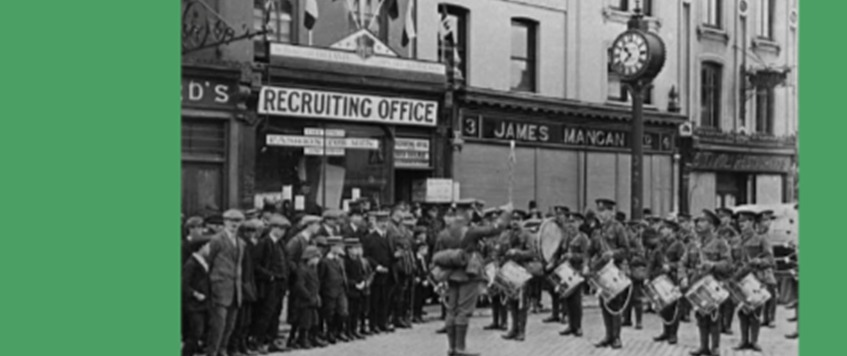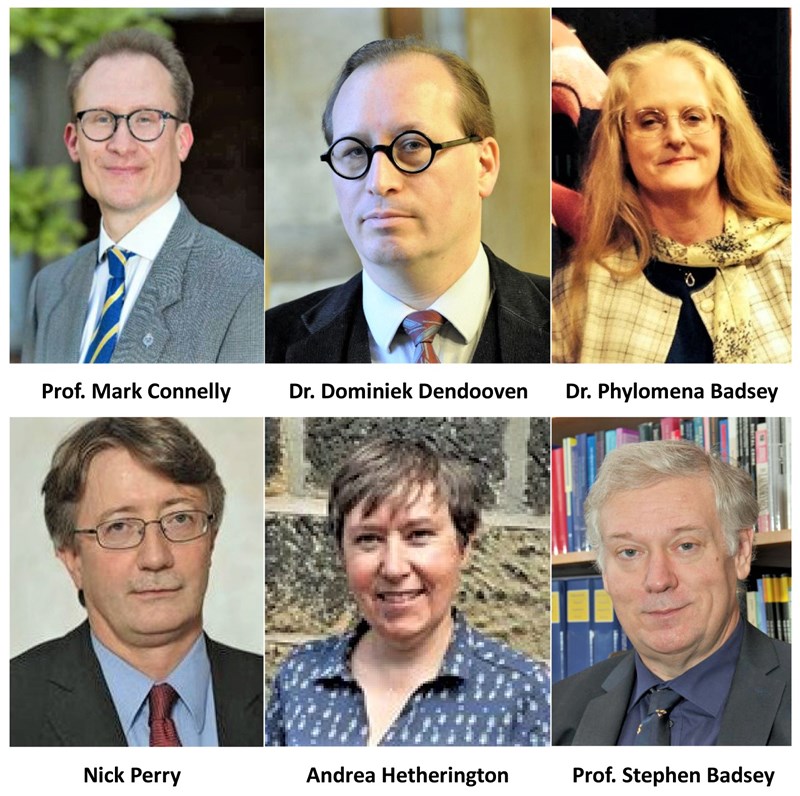
On 7 October 2023, the Cork Branch of The Western Front Association will be holding a one-day conference on ‘Aspects of the Great War’. As the title suggests, during the conference a panel of six leading academics and historians will examine different military, social and political aspects of the conflict. There will also be a display of artefacts from the war, members of the Cork Branch will be manning a research desk and some of the speaker’s books will also be on sale.
- Doors open at 08:45 for a 09:30 start
- Conference ends at 17:30
Price: €15/£13
- Price includes tea and coffee
- An attractive lunch menu is available in the hotel and lunch can be booked before the conference starts
Tickets: Can be purchased or booked by contacting Francis O’Connor at:
- Phone: 00353866067316
- Email: francisoc@live.ie

Speakers and Topics
Prof. Mark Connelly: 'Why and How the Allies Won'
Mark Connelly is Professor of Modern British History at the University of Kent. His main research and teaching interest is the British Empire in the Great War, and in particular the work of the Imperial War Graves Commission. His publications include: Reaching for the Stars: A History of Bomber Command (I.B.Tauris, 2014), Steady the Buffs!: A Regiment, a Region, and the Great War (OUP, 2006), The Great War, Memory and Ritual: Commemoration in the City and East London, 1916-1939 (Royal Historical Society, 2015), Great Battles: Ypres, with Stefan Goebel (OUP, 2019) and Postcards from the Western Front: veterans, pilgrims and tourists after the Great War (McGill-Queen's University Press, 2022).
In his paper, Mark Connelly looks at the advantages and problems faced by both the allies and the central powers in prosecuting the war, and the reasons why it took the allies so long to bring their great assets properly into effect. It therefore also considers the higher-level management of the conflict by both blocs and the nature of civil-military engagement as well as assessing the success of the mobilisation methods each side deployed.
Nick Perry: Oliver Nugent and the Ulster Division - A Modern Major-General?
Nick Perry read history at Trinity College Dublin and then spent thirty-seven years as a civil servant in London and Belfast. Since his retirement in 2018, he has been at the University of Kent researching the Irish landed class and the British army. He is the author of the prize-winning biography, Major-General Oliver Nugent: The Irishman who led the Ulster Division in the Great War (Ulster Historical Foundation, 2022), and he is a Fellow of the Royal Historical Society.
In his paper, Nick Perry looks at the life and times of Major-General Oliver Nugent, commander of the Ulster Division in the Great War. Nugent is not only an important figure in twentieth-century Irish military history: his experiences, which include colonial campaigning, internal security operations and command of a highly-politicised formation in an intensive, technologically fast-moving conflict under close media scrutiny, have surprisingly modern dimensions which make him a relevant figure even today.
Dr. Phylomena Badsey: 'Vera Brittain and her experience of both ends of the Chain of Evacuation'
Dr. Phylomena Badsey MA was awarded her PhD from Kingston University in 2005, its topic ‘The Political Thought of Vera Brittain’ was the pinnacle of many years research into women and the Great War. In December 2010, she was awarded an MA in Second War Studies (with Merit) from the University of Birmingham. She has a wide variety of research interests and since 1992, she has been a frequent speaker for the Western Front Association. She was also the Co-ordinator for the WFA Open Public Lecture Series (2014-2018) and was appointed the WFA Universities Officer in August 2016. She also served as a WFA Trustee from 2017 to 2021. Her most current publications are ‘Queen Alexandra’s Royal Naval Nursing Service and Reserve Nurses and Care-giving at Gallipoli’ for Gallipoli: New Perspectives on the Mediterranean Expeditionary Force 1915-16 (Helion & Company Limited, 2018) and the chapter ‘Women and the Great War, a transient transformation of their place in Society?’ in Peter Liddles’ Britain and Victory in the Great War (Pen and Sword, 2018).
In her paper, Phylomena Badsey will focus on Vera Brittain's experiences of the chain of evacuation in Buxton - a convalescence and treatment hospital, the 1st General Hospital, London, and St. Thomas’s and then Queen Alexandra’s Hospital, London, - both military hospitals, and her oversea service in Malta and 24th General Hospital at Etaples, France. The Chain of Medical Evacuation was created by medical personnel during the Second Anglo-Boer War (11 Oct 1899- 31 May 1902). This conflict has been called the training ground for British Army nurses.
Vera Brittain (1897-1970) is best known for her sixth book Testament of Youth, An Autobiographical Study of the Years 1900-1925, published in 1933 and her own war diary, Chronicle of Youth, published in 1981.Testament of Youth opens with Vera Brittain as a young, middle-class girl seeking higher education and a role for herself in the wider world, outside marriage. She discusses the life of provincial Buxton, and her relationships with her brother Edward, his close school friends Roland Leighton and Victor Richardson and later Geoffrey Thurlow. The outbreak of the Great War with all the excitement and naive patriotism, soon becomes the main theme of the book. Vera Brittain describes her changing moods and reactions to the war news and details her own decision to train and serve as a Voluntary Aid Detachment Nurse (V.A.D.), in June 1915. She trained in Buxton before being posted to the 1st General Hospital, London, in November. In March 1916, she volunteered for overseas service. The following September, she was posted to Malta where she remained until May 1917. She requested a posting to the Western Front, and she was sent to 24th General Hospital at Etaples in Northern France from August 1917 until late April 1918. She broke her service contract at the command of her father to return at once and nurse her mother. Vera Brittain was to feel ‘a deserter, a coward, a traitor to my patients and the other nurses’ and remained ‘conscience-stricken’ for many years. She resented being called home over what was, a minor domestic crisis, and her mother soon recovered from her illness. Vera Brittain returned to a home posting, nursing first at St. Thomas’s and then Queen Alexandra’s Hospital, London, in September 1918 until April 1919.
Dr. Dominiek Dendooven: 'Ireland in Ypres 1914- 2014, places, personalities, pilgrimages and projects'
Born in Bruges, Dominiek Dendooven completed his studies in history (1994) and in archival science (1995) at the Vrije Universiteit Brussel. In 2018, he obtained a PhD in History from the University of Kent and the Universiteit Antwerpen. He has been a curator and researcher at the In Flanders Fields Museum in Ieper since 1998. His main research interests are the presence of non-European troops on the Western Front during the Great War and the long-term impact of their European residence, the war experience of the local populations near the front line, as well as the post-war reconstruction and the development of the ‘memory landscape’ of Flanders. As a ‘museum person’, he attaches great importance to material culture such as (trench) art or memorials as an alternative historical source.
His publications include: Menin Gate & Last Post: Ypres as Holy Ground (Klaproos, 2001), World War I: Five Continents in Flanders, with Piet Chielens (Lannoo, 2008), India in Flanders Fields, with Rana Chhina (USI of India, 2017), Ypres, War and Reconstruction: A Photographic Account by Maurice and Robert Antony, with Piet Chielens and Jan Dewilde (Tijdsbeeld, 2020) and Asia in Flanders Fields: Indians and Chinese on the Western Front, 1914 1920 (Pen and Sword, 2021).
Few places on the European continent are as connected to the Emerald Isle's past as Ypres and the battlefields that surround this Flemish city. From the Irish nuns who had to leave their old convent in the besieged city in 1914, to the joint pilgrimage undertaken by Enda Kenny and David Cameron on the eve of the centenary of the First World War, Dominiek Dendooven’s paper explores the significance of Ypres to Ireland’s history, in war, in peace, and in peacemaking.
Andrea Hetherington: 'Deserters of the First World War – The Home Front in Ireland'
Andrea Hetherington is an independent researcher and writer with a particular interest in the social history of the First World War. She is the author of three books on the First World War: Lawnswood’s Great War Stories (Friends of Lawnswood Cemetery, 2015), Britain’s First World War Widows - the Forgotten Legion (Pen and Sword, 2018) and Deserters of the First World War - the Home Front (Pen and Sword, 2021). She has also contributed chapters to several anthologies. Andrea has provided consultancy services to a number of Great War commemorative projects and conducted research for the BBC. She is also the Book Reviews Editor for Stand To!. Andrea now combines a career as a part time criminal defence solicitor with that of an increasingly full-time historian.
The story of the deserters who were shot at dawn has often been told, but these soldiers represent a tiny proportion of absconders from the British and Dominion forces. Men disappeared from camps and barracks within Great Britain and Ireland at an alarming rate. In her paper, Andrea Hetherington will explore this phenomenon, looking at the motivations and survival strategies of these deserters and the unique role Ireland played in this story.
Prof. Stephen Badsey: 'The Western Front and the Armistice'.
Stephen Badsey PhD MA (Cantab.) FRHistS recently retired as professor of conflict studies at the University of Wolverhampton. The author of more than 100 books and articles, he has spoken on military matters in many countries, and he continues to talk, publish and advise on several aspects of military history, particularly propaganda and the conduct of war. His publications include: Arnhem 1944: Operation Market Garden (Osprey, 1993), The Franco- Prussian War 1870-1871 (Osprey, 2003), The British Army in Battle and its Image 1914-18 (Continuum International Publishing Group Ltd, 2009), Doctrine and Reform in the British Cavalry 1880–1918 (Routledge, 2016) and his most recent book, The German Corpse Factory: A Study in First World War Propaganda (Helion, 2019).
In his paper, Stephen Badsey follows the sequence of critical events of September-November 1918 on the Western Front leading to the Armistice. Opening with the meeting of the Armistice delegations in November, it looks back over the previous weeks to place the Allied victories in a wider context, showing how at times events converged to overwhelm the participants. The defeat of the German Army on the Western Front interacted with the collapse of the Central Powers elsewhere, and with the differing political objectives of the Allies, the United States, and Germany, including the role of the German General Staff, and of the senior Allied generals.
The presentation concludes by explaining how the Armistice came to be signed, and how the war ended.





